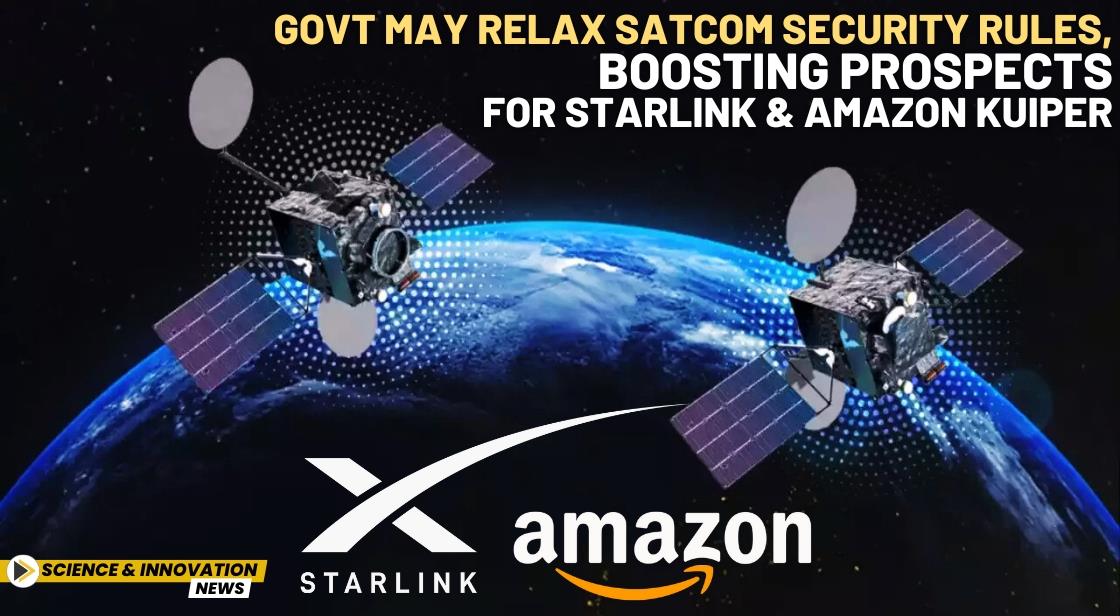Govt May Relax Satcom Security Rules, Boosting Prospects for Starlink and Amazon Kuiper

News Synopsis
The Indian government is considering relaxing certain security regulations for satellite communication (satcom) licenses to align with global standards, according to a report . This move could pave the way for global satcom giants like Elon Musk's Starlink and Jeff Bezos’s Amazon Kuiper to expand their services in India.
Currently, entities seeking satcom licenses in India must comply with 30-40 stringent conditions under the Global Mobile Personal Communication by Satellite (GMPCS) system.
While specific rules under review have not been disclosed, discussions between the Department of Telecommunications (DoT) and law enforcement agencies are ongoing. National security remains a key priority in these deliberations.
Applications Pending Amid Regulatory Adjustments
Both Starlink and Amazon Kuiper have applications for GMPCS licenses under review, as they have yet to meet all security prerequisites. Notably, Starlink has urged the Indian government to align satcom regulations with international norms due to the global nature of its services. Telecom Minister Jyotiraditya Scindia emphasized that Starlink must fully comply with existing rules before its license can be issued.
Tensions Between Satcom and Indian Telecom Giants
This development takes place amidst a broader debate between international satcom providers and Indian telecom operators like Reliance Jio, Bharti Airtel, and Vodafone Idea. Indian telecom companies argue that satellite spectrum should be allocated through auctions, similar to their spectrum acquisition process, whereas the government plans administrative allocation with associated fees.
Starlink and Amazon Kuiper’s Expansion Plans
Starlink has already launched over 6,000 low-earth orbit (LEO) satellites and pledged to provide free connectivity in rural India under government initiatives. Meanwhile, Amazon’s Project Kuiper aims to deploy 3,236 satellites starting in 2025, with commercial services expected later that year.
India’s Expanding Space Economy
This policy shift comes at a critical time for India’s space sector, which is poised for significant growth. The space economy is expected to reach $44 billion by 2033, capturing 8% of the global market share, up from the current 2%, according to IN-SPACe, India’s space sector regulator.
Companies with existing GMPCS licenses, including Bharti-backed Eutelsat OneWeb and Reliance Jio’s joint venture with SES, are also expected to participate in upcoming discussions.
What is Amazon Kuiper?
Amazon Kuiper, officially called Project Kuiper, is Amazon's ambitious satellite internet initiative aimed at providing broadband internet connectivity across the globe, especially in underserved or remote regions. The project envisions deploying a constellation of 3,236 low Earth orbit (LEO) satellites to create a network capable of delivering high-speed, low-latency internet services.
Key Features of Amazon Kuiper
-
Global Connectivity: Kuiper aims to bridge the digital divide by delivering affordable internet to remote areas with limited or no access to broadband.
-
Low Earth Orbit Satellites: Operating in LEO, these satellites reduce latency compared to traditional geostationary satellites.
-
Scalable Infrastructure: Amazon plans to use advanced technologies and infrastructure to ensure seamless scalability as the user base grows.
-
Commercial Timeline: The first satellites are expected to launch in 2025, with commercial services slated to begin shortly thereafter.
Integration with Amazon's Ecosystem
Kuiper will integrate with Amazon's other services, including its cloud computing platform AWS (Amazon Web Services), potentially bolstering IoT (Internet of Things) applications, cloud services, and real-time data analysis.
Competition
Amazon Kuiper competes with similar initiatives like SpaceX’s Starlink, which is further ahead in deploying LEO satellite networks. Other competitors include OneWeb and Telesat.
Progress
-
FCC Approval: The project received approval from the U.S. Federal Communications Commission (FCC) to deploy its satellites.
-
Investments: Amazon has pledged an investment of over $10 billion to bring Kuiper to fruition.
-
Manufacturing and Launching: The satellites will be manufactured in Amazon’s satellite production facility, with launches to be facilitated through partnerships, including agreements with Blue Origin (owned by Jeff Bezos) and other launch providers.
Kuiper’s mission aligns with Amazon’s goal to improve global connectivity and access to digital tools, making it a critical player in the evolving satellite internet market.
Conclusion: Balancing Innovation and Security in India's Satcom Landscape
The Indian government's potential relaxation of satellite communication security rules signals its commitment to fostering innovation and aligning with global standards in the rapidly evolving satcom industry. This move holds significant promise for global players like Starlink and Amazon Kuiper, enabling them to enhance connectivity across the country, especially in underserved areas.
However, this initiative must strike a balance between easing regulatory hurdles and addressing national security concerns. As debates between satcom providers and Indian telecom giants over spectrum allocation intensify, the government's approach will play a pivotal role in shaping the future of India's space economy.
With India's space sector poised to grow to $44 billion by 2033, such policy adjustments could mark a transformative phase, attracting international investments and fostering collaborations. These changes will not only elevate India’s position in the global satellite internet market but also bridge the digital divide, empowering millions with better access to technology and communication services.
You May Like









